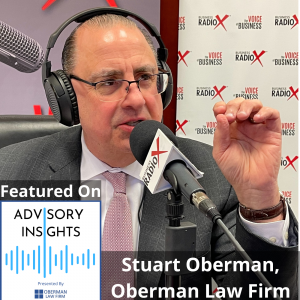
Employer-Related Compliance Trends in 2023 (Advisory Insights Podcast, Episode 32)
On this episode of Advisory Insights, Stuart Oberman of Oberman Law Firm discussed employer-related compliance trends in 2023. Stuart talked about pay transparency laws requiring employers to include salary range information in job postings, employee privacy laws governing how data is used in employment relationships, and more.
Advisory Insights is presented by Oberman Law Firm and produced by the North Fulton studio of Business RadioX®. The series can be found on all the major podcast apps. You can find the complete show archive here.
TRANSCRIPT
Intro: [00:00:01] Broadcasting from the Studios of Business RadioX, it’s time for Advisory Insights. Brought to you by Oberman Law Firm, serving clients nationwide with tailored service and exceptional results. Now, here’s your host.
Stuart Oberman: [00:00:19] And welcome everyone to Advisory Insights. Stuart Oberman here, your host. All right. Folks, we’re going to talk about employer related compliance trends in 2023. Yes, yes, yes, 2023, off and running. There is a lot of things going on in 2023 that our employers must, must know.
Stuart Oberman: [00:00:42] And there’s not necessarily any order of priority here, but there is a great, great trends regarding pay transparency laws that are going to be even more expansive in the future. So, the laws generally require – this is overly broad here – employers to include salary range information in job postings. Now, this is cropped up in California, of course, Washington, and New York. But I will tell you, there’s a lot of other legislation that is pending or being discussed in multiple states.
Stuart Oberman: [00:01:23] So, I think what has to happen is if you’re an employer and you’ve got employees in those states and you’re posting jobs in those states, you’ve got to understand what the ramifications are of the pay transparency laws. I would suggest that you have a broad policy on this because it is not really a matter of if it comes to your state, it’s when. So, obviously, California, Washington, and New York are more of the liberal states. Again, I’m not getting into politics, but I see a trend here that’s already from west to east. And, again, it’s going to go north and it’s going south, so it’s just a matter of time.
Stuart Oberman: [00:02:05] A next big topic, which, of course, originates in some more of these states, is employee privacy. What we’re seeing is that California is really at the forefront of this. But Illinois even became first on this issue. So, recently, the California Privacy Act – excuse me – California Privacy Rights Act has really brought, in my opinion, employee privacy to the forefront in the U.S. So, the law came in effect on January 1st.
Stuart Oberman: [00:02:43] Now, the interesting part, you’ve got to go back in history a little bit – and I don’t want to bore you guys – this particular law actually follows the Illinois Biometric Information Privacy Act, which was enacted in 2008 in Illinois. Now, you’ve got to understand where all this is coming from.
Stuart Oberman: [00:03:07] So, under the California law – again, here we go. We’re in California, Washington. Now, we’re hitting Midwest. We got New York City going here. Again, this is going to be propping up in multiple states, in my opinion – the California law mandates – not says may or not says, you know, we really want it to. It mandates. It governs – how the aspect of an employment relationship on how data is used in this context.
Stuart Oberman: [00:03:43] Now, what does that mean? So, it actually outlines what employers in artificial intelligence can and cannot utilize that information on, privacy, background checks, those kind of things. So, I think you need to really have a plan as a whole. It doesn’t matter whether you’re in Illinois, California, Washington, I don’t really care. You’ve got to figure out what your policy is and procedures on how to handle this data and whether or not your policies and procedures fit within those four or five states that, you know, is very broad.
Stuart Oberman: [00:04:23] And especially if you have employees in those multiple states and you’re a multinational employer, if your main office is in Charlotte, how do you deal with an employee and you run background checks for employees in Washington or New York? How do you deal with that? You’ve got to have policy in place with that.
Stuart Oberman: [00:04:42] The next one really is a very, very aggressive legislative change, and we’re seeing more and more of this. And I think it’s just a matter of time before the states have a version of this, which was, employee leave. I think we’re going to see, not necessarily on a federal level, but we’re going to see employers, we’re going to continue to see, I think, some broad movement on paid leave on a state and local level.
Stuart Oberman: [00:05:15] So, again, I want to go back to Illinois because they seem to be the most recent here on what we’re looking at. So, they passed the Paid Leave Act For All Employers – all workers – excuse me – the official name, Paid Leave For All Workers Act on January 10th. Now, once the law takes effect – and there’s a question whether that takes effect. From all indication, it’s going to take effect next year – employers – get this – must annually provide covering employees up to 40 hours of paid leave, which they can use for any purpose.
Stuart Oberman: [00:05:55] Folks, you’ve got to understand the ramifications of that, again, if you’re a multinational employer. Now, what we’re going to see is we’re going to see, I believe, different versions of this trickle down in certain water down states where it may not be as aggressive. Or in some areas, depending on the legislation, you’re going to see more aggressive leave. So, I think you need to start looking now what your policies are and procedures.
Stuart Oberman: [00:06:25] We have had some cases that our employers have actually acquired companies. And deep in their particular H.R. matters, they did not realize that their companies that they acquired had no limitation on leave. Folks, do you understand that? You just purchased a $50 million business, 5 million, 10 million, I don’t really care. And all of a sudden, their policy that you inherited and you’ve got to deal with, it says that their leave of absence is unlimited. How do you deal with that? First of all, how do you miss that? A lot of things go into that scenario.
Stuart Oberman: [00:07:16] Next, we’ve talked about this one on our two previous podcasts, non-competes. So, I don’t want to belabor this. Again, I think it’s a trend. The FTC has issued a proposed ban – which is under a lot of review – for non-competes. So, if that occurs, that will fundamentally change the relationship of current employees and future employees as far as what you can and cannot enforce.
Stuart Oberman: [00:07:48] Folks, that is just about four or so topics that are really the hot topics right now going in 2023. And I’m telling you, I’m sure there’s going to be offshoots, extensions, reductions of these various policies and procedures under state, federal, and even national level. So, keep track of what’s going on. Keep listening to our podcast.
Stuart Oberman: [00:08:13] Folks, thanks for joining us today on Advisory Insights. Stuart Oberman, your host. If you have any questions, please feel free to give us a call, 770-886-2400 or stuart@obermanlaw.com. Have a fantastic day.
Outro: [00:08:28] Thank you for joining us on Advisory Insights. This show is brought to you by Oberman Law Firm, a business-centric law firm representing local, regional, and national clients in a wide range of practice areas, including health care, mergers and acquisitions, corporate transactions, and regulatory compliance.
About Advisory Insights Podcast
Presented by Oberman Law Firm, Advisory Insights Podcast covers legal, business, HR, and other topics of vital concern to healthcare practices and other business owners. This show series can be found here as well as on all the major podcast apps.
Stuart Oberman, Oberman Law Firm

Stuart Oberman is the founder and President of Oberman Law Firm. Mr. Oberman graduated from Urbana University and received his law degree from John Marshall Law School. Mr. Oberman has been practicing law for over 25 years, and before going into private practice, Mr. Oberman was in-house counsel for a Fortune 500 Company. Mr. Oberman is widely regarded as the go-to attorney in the area of Dental Law, which includes DSO formation, corporate business structures, mergers and acquisitions, regulatory compliance, advertising regulations, HIPAA, Compliance, and employment law regulations that affect dental practices.
In addition, Mr. Oberman’s expertise in the healthcare industry includes advising clients in the complex regulatory landscape as it relates to telehealth and telemedicine, including compliance of corporate structures, third-party reimbursement, contract negotiations, technology, health care fraud, and abuse law (Anti-Kickback Statute and the State Law), professional liability risk management, federal and state regulations.
As the long-term care industry evolves, Mr. Oberman has the knowledge and experience to guide clients in the long-term care sector with respect to corporate and regulatory matters, assisted living facilities, continuing care retirement communities (CCRCs). In addition, Mr. Oberman’s practice also focuses on health care facility acquisitions and other changes of ownership, as well as related licensure and Medicare/Medicaid certification matters, CCRC registrations, long-term care/skilled nursing facility management, operating agreements, assisted living licensure matters, and health care joint ventures.
In addition to his expertise in the health care industry, Mr. Oberman has a nationwide practice that focuses on all facets of contractual disputes, including corporate governance, fiduciary duty, trade secrets, unfair competition, covenants not to compete, trademark and copyright infringement, fraud, and deceptive trade practices, and other business-related matters. Mr. Oberman also represents clients throughout the United States in a wide range of practice areas, including mergers & acquisitions, partnership agreements, commercial real estate, entity formation, employment law, commercial leasing, intellectual property, and HIPAA/OSHA compliance.
Mr. Oberman is a national lecturer and has published articles in the U.S. and Canada.
Oberman Law Firm
Oberman Law Firm has a long history of civic service, noted national, regional, and local clients, and stands among the Southeast’s eminent and fast-growing full-service law firms. Oberman Law Firm’s areas of practice include Business Planning, Commercial & Technology Transactions, Corporate, Employment & Labor, Estate Planning, Health Care, Intellectual Property, Litigation, Privacy & Data Security, and Real Estate.
By meeting their client’s goals and becoming a trusted partner and advocate for our clients, their attorneys are recognized as legal go-getters who provide value-added service. Their attorneys understand that in a rapidly changing legal market, clients have new expectations, constantly evolving choices, and operate in an environment of heightened reputational and commercial risk.
Oberman Law Firm’s strength is its ability to solve complex legal problems by collaborating across borders and practice areas.
Connect with Oberman Law Firm:
Company website | LinkedIn | Twitter
















